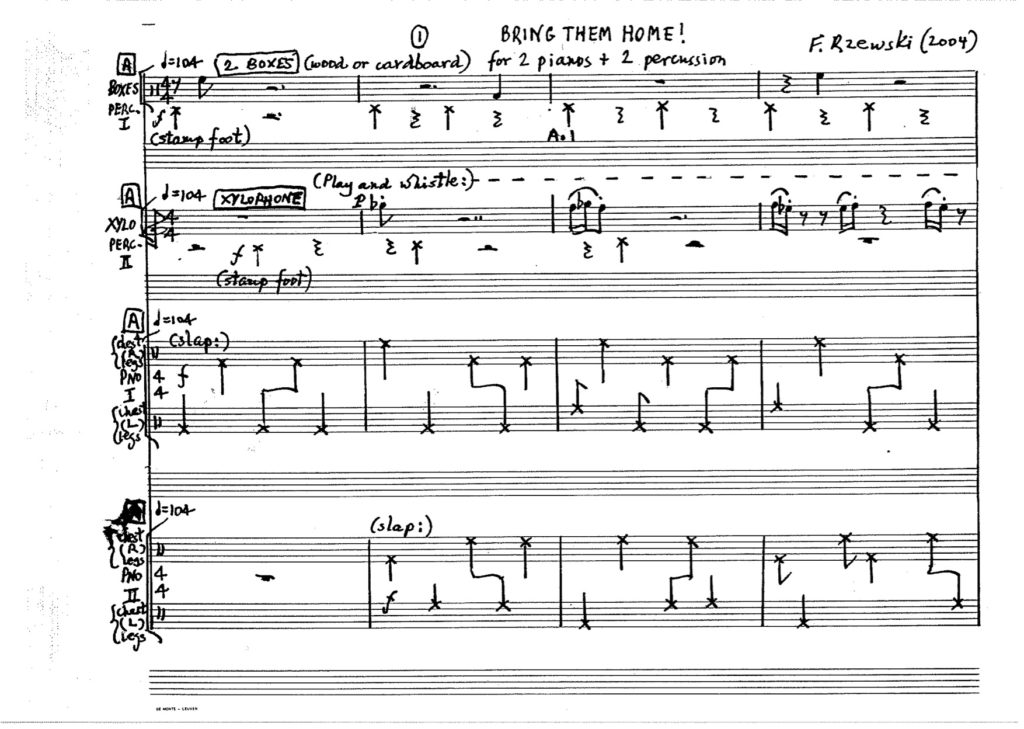Whenever I think of new music mavericks, Frederic Rzewski is one of the first composers I think of. While I don’t necessarily find all of his music compelling, I respect the unique sonority, political awareness and idiosyncrasy that defines him. You do not have to dig deep to find narrative and meaning in his work. While often discussed in the rubric of American minimalists, his particular style is not so much about repetition than subtle gradation and variation. In Bring Them Home!, Rzewski has imprinted an unambiguous message against the U. S. military interventions of this generation. Like Picasso in Guernica or even the music of Pete Seeger, this work is full of great things in and of itself, but carrying with it the artists’ genuine desire for change – and the capacity to change. I think you should perform this work because it is a well-written piece of music that will challenge you and your audience; regardless of your feelings about the military complex, if you can give listeners a cogent reference with which to listen, it can make their experience more rewarding. The structure of the piece is theme and variations – an old Irish folk song (wiki) siúil, a rún, in which a woman laments her love who has enlisted. The song, which evolved into Johnny Has Gone for a Soldier, depending on your perspective, can be viewed as an Irish protest song or a melancholic tune about the losses and sacrifices that unheroically accompany conflict. Each variation feels geometric, like a series of boxes rather than a flowing structure. Some explode, some crystallize, but without a feeling of journey or permanent apex. The piece never loses its composure, its measured clarity. Some of the variations end in a featured solo – divided among each player in turn – after which the option of free improvisation is given. It is a measured, and effective way to allow each performer a small commentary, and provide an interpretation that is by definition more personal. This piece doesn’t end with the doomsday bravura of Coming Together, and its not a tour de force like The People United, but it is the sort of piece that feels worth it – to listen to, to rehearse and prepare. As performers, it is always fun to see where each soloist will go, and where it will take the piece. Plus, in this day and age, it is a good idea to consider what you can do, as a performer, to be playing the changes you wish to see in the world. Optional section: Notes to the Performer:
Title: Bring Them Home! Composer: Frederic Rzewski Country: USA Duration: 23 min Date of Composition: 2004 Publisher: n/a Purchase Link: free at IMSLP Commission: Dedication: Premiere: Marilyn Nonken, Ursula Oppens, Tom Kolor, Dominic Donato, Oct 22, 2005, Miller Theatre, NYC, USA Performance History: Discography: Related Articles: A Composer’s Work Becomes a Platform for Political Ideals, NY Times, Oct 22, 2005 Playing Crazy Never Felt So Good, Globe and Mail, May 29, 2007 Rzewski, Then and Now, San Francisco Classical Voice, June 12, 2007
Program Note from SFCMP Performance in 2007 – Download
“I don’t think it’s a good idea to alienate the audience” – Frederic Rzewski Via Wikipedia Rzewski began playing piano at age 5. He attended Phillips Academy, Harvard and Princeton, where his teachers included Randall Thompson, Roger Sessions, Walter Piston and Milton Babbitt. In 1960, he went to Italy, a trip which was formative in his future musical development. In addition to studying with Luigi Dallapiccola, he began a career as a performer of new piano music, often with an improvisatory element. A few years later he was a co-founder of Musica Elettronica Viva with Alvin Curran and Richard Teitelbaum. Musica Elettronica Viva conceived music as a collective, collaborative process, with improvisation and live electronic instruments prominently featured. In 1971 he returned to New York.[1] In 1977 Rzewski became Professor of Composition at the Conservatoire Royal de Musique in Liège, Belgium, then directed by Henri Pousseur. Occasionally he teaches for short periods at schools and universities throughout the U.S. and Europe, including Yale University, the University of Cincinnati, the California Institute of the Arts, the University of California, San Diego, the Royal Conservatory of The Hague and Trinity College of Music, London.[1] Many of Rzewski’s works are inspired by secular and socio-historical themes, show a deep political conscience and feature improvisational elements. Some of his better-known works include The People United Will Never Be Defeated! (36 variations on the Sergio Ortega song El pueblo unido jamás será vencido), a set of virtuosic piano variations written as a companion piece to Beethoven’s Diabelli Variations; Coming Together, which is a setting of letters from Sam Melville, an inmate at Attica State Prison, at the time of the famous riots there (1971); North American Ballads; Night Crossing with Fisherman; Fougues; Fantasia and Sonata; The Price of Oil, and Le Silence des Espaces Infinis, both of which use graphical notation; Les Moutons de Panurge; and the Antigone-Legend, which features a principled opposition to the policies of the State, and which was premiered on the night that the United States bombed Libya in April 1986.[1] Rzewski’s recent compositions include the Nanosonatas (2006~2010) and the Cadenza con o senza Beethoven (2003), written for Beethoven‘s Fourth Piano Concerto. Rzewski played the solo part in the world premiere of his piano concerto at the 2013 BBC Proms.[2] Nicolas Slonimsky (1993) says of him in Baker’s Biographical Dictionary of Musicians: “He is furthermore a granitically overpowering piano technician, capable of depositing huge boulders of sonoristic material across the keyboard without actually wrecking the instrument.”[3]
 SHED – Toca Loca – Henceforth Records iTunes | Amazon | Spotify
SHED – Toca Loca – Henceforth Records iTunes | Amazon | Spotify









